At FHE Health, we work closely with each patient to understand exactly what they’re facing. In some situations, the mental health and substance abuse disorders we treat are also co-occurring with other forms of addiction. Called process addictions or behavioral addictions, these conditions may not demonstrate a physical dependency in the same way as alcohol or drugs. Yet, many men and women struggle through negative consequences as a direct result of these conditions.
These nonchemical dependencies are different from other forms of addiction and require a different treatment plan. We treat process addictions, usually as a result of them co-occurring with other mental health issues, using the most modern methods. Every patient’s needs are unique, but with an individualized treatment plan, these vices can be overcome.
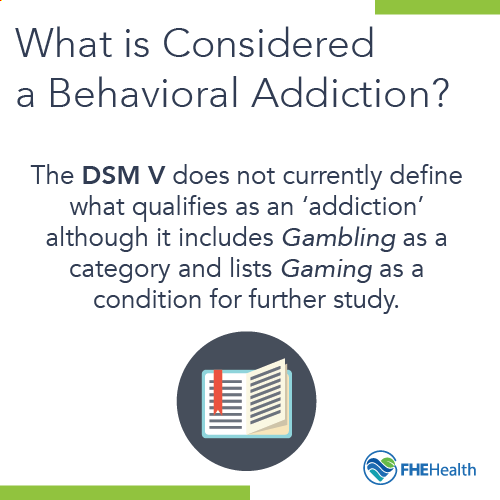 What Is a Process Addiction?
What Is a Process Addiction?
Process addiction occurs when a compulsive behavior takes place repeatedly, creating a negative impact on a person’s life. The need to continue engaging in that activity, even while understanding the negative consequences, is difficult to fight. People who have this type of condition generally suffer mental and physical health complications as a result. In some cases, these behavioral addictions also create tension at home, limit a person’s ability to do his or her job and create a sense of guilt.
Some people are overwhelmed by the consequences they face after engaging in this type of addiction, yet still feel unable to just stop. Obtaining treatment for process addiction can help a person stop the negative behavior.
The definition of process addiction may seem vague, but that’s because many types of addictive behaviors fall under this term. This can range from gaming addictions to exercise addictions and many others.
How Does Process Addiction Compare to Substance Abuse Addiction?
Substance abuse disorder occurs when a person uses a drug to achieve a desired outcome. This includes illicit drugs such as heroin or cocaine, as well as prescription medications used improperly and over-the-counter drugs. Those who suffer from substance abuse develop a high tolerance for the drug, requiring more of the same substance to achieve the same level of high. Over time, substance abuse creates changes in brain chemistry, causing the body to demand the drug in order to function. And it often results in a significant amount of pain and discomfort when withdrawal symptoms from the drug occurs.
The biggest difference in process addictions compared to substance abuse is the lack of an actual substance. A secondary difference is that there are likely no physical signs or symptoms of addiction as there are with a substance abuse disorder. Nevertheless, these are addictions, according to the American Psychological Association, because they involve a high frequency of use, repetitiveness and excessive use. Many develop an inability to stop engaging and can experience cravings. A chemical change is occurring due to this behavior, but it is not a chemical being introduced into the body; rather, it is the release of dopamine from the external activity. This reward of participating in the activity can, itself, be addictive.
In many ways, there are a lot of commonalities between substance abuse and process addictions, including:
- The development of a tolerance, requiring additional access to the substance or activity in order to gain the same level of satisfaction
- Symptoms of withdrawal, though not always physical, can occur; people with process addictions may develop anxiety, for example, if they cannot access their substance addiction
- Focused energy on the addiction, often putting aside other responsibilities
- Inability to stop the behavior, even when an individual understands the negative consequences
- Loss of some type, such as loss of the ability to focus on other activities, financial loss or development of relationship problems
When an individual is suffering like this, it becomes critical to seek out medical care. Many times, substance abuse disorders can occur alongside process addictions.
What Are the Most Common Process Addictions?
Those engaging in compulsive behavior often struggle day-to-day with it.
The following are the most common process addictions:
 Shopping Addiction
Shopping Addiction
A shopping addiction is a common type of addiction. It’s defined as a need to constantly buy things, even if there is no need for the items, though those with a shopping addiction may be able to explain any purchase they make. Many with a shopping addiction also spend far more than their budget allows. They may have high credit card bills. Some end up simply storing the items they purchase without ever using them. It’s not an addiction to owning items as much as it is the thrill of buying something new. Shopping addictions can cause relationship problems as their unrealistic explanations and financial issues accrue.
 Sex Addiction
Sex Addiction
Sex addiction is a constant need to engage in sex. While healthy sexual relations are not a negative experience, for some, sex becomes an addiction that is difficult to control. They may seek out adult material and online relationships and even pay for relations illegally. Some sufferers may have a tendency to cheat on a spouse as a result. Sex addiction often involves reckless decisions about engaging in sexual behavior.
 Gambling Addiction
Gambling Addiction
Gambling addiction is widely recognized. While some may start out with just a few bets and having fun, those with addictive behaviors go further. They may place higher bets or engage in gambling more frequently. They may chase their losses by betting beyond their financial limitations. Many find they feel intense emotions when they lose, such as aggression, irritability or anxiety. They spend most of their time finding a way to gamble either locally or through travel. Gambling addictions can also occur in apps and games online.
 Gaming Addiction
Gaming Addiction
A newer form of addiction is gaming. As gaming is more accessible and more socially acceptable, more people prone to use them addictively are introduced to them. While most people only engage in playing video games from time to time in healthy amounts, those with an addiction spend most of their time gaming or thinking about gaming. They develop relationships online but may have trouble with in-person expectations. It can be easy to view type of addiction as harmless, but those who have it may develop a compulsivity that results in difficulty maintaining relationships, jobs and physical health.
Food Addiction
Food addiction is a constant desire to eat, even when overeating occurs. Those with a food addiction eat because they are bored, but also because it makes them feel good. Their actions become compulsive, and they often consume food at caloric intakes far higher than what’s considered safe. Some may be overweight, but that’s not always the case.
Sufferers may develop self-esteem complications, eating disorders and health problems. They may hide foods, stop to eat frequently and seek out high-sugar or high-fat foods much in the same way an alcoholic seeks out a drink.
Exercise Addiction
Though seemingly a nonconcern, exercise addiction occurs when an individual cannot seem to stop this behavior for any length of time. They chronically feel the need to visit a gym or to workout. They buy products, invest significantly in the exercise of their choice and often miss responsibilities as a result. They are obsessive about the way they look.
What Treatment Is Available for These Behavioral Addictions?
People with behavioral addictions like these need supportive therapy designed to address their specific needs. This treatment generally includes:
- Detox support to stop the engaging activity: This does not mean medication-assisted detox, as it would for substance abuse, but it does include abstinence from the addiction with support and replacement activities.
- Diagnosis and full evaluation from a licensed professional
- The development of a treatment plan to address the individual’s needs (which may include any substance abuse or mental health issues present)
- Group and family counseling to gain a support network
- Holistic care to improve a person’s self-esteem and aid in treating any resulting medical issues
Treatment for addictive behavior like this is always based on the individual’s needs. It may include helping to make lifestyle changes, handling psychological distress and managing emotional distress. A key component of the process is managing the day-to-day needs of the patient in a safe environment to break the cycle of engagement.
Why FHE Is the Right Place for Treatment of Process Addictions
If you or a family member is struggling, FHE can help. FHE Health treats mental health and addiction disorders on our campus. Many times, we also offer behavioral addiction treatments like these as they co-occur with other addictions. Our wide array of professionals and treatment types allows us to customize care for each patient. We are experienced in treating all forms of addiction. And, in some cases, we have specifically designed programs for those facing process addictions, including a gambling addiction therapy.

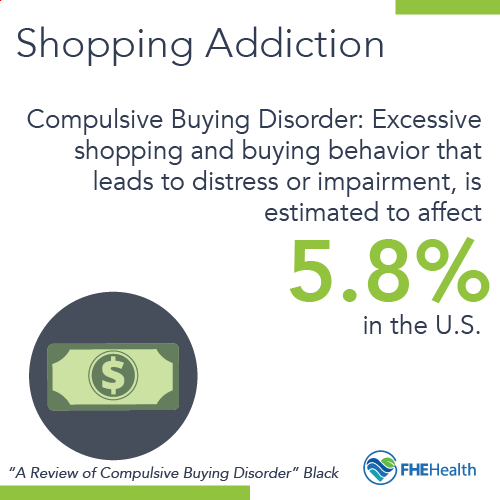 Shopping Addiction
Shopping Addiction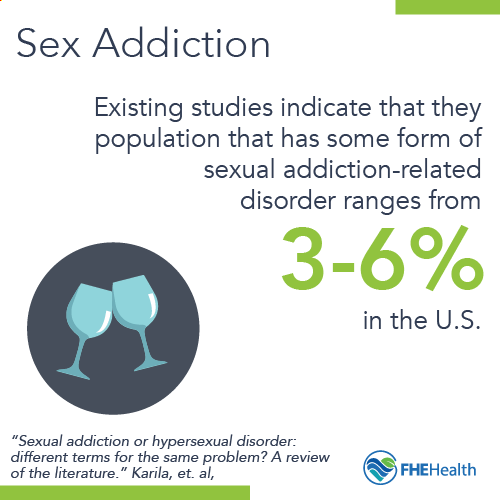 Sex Addiction
Sex Addiction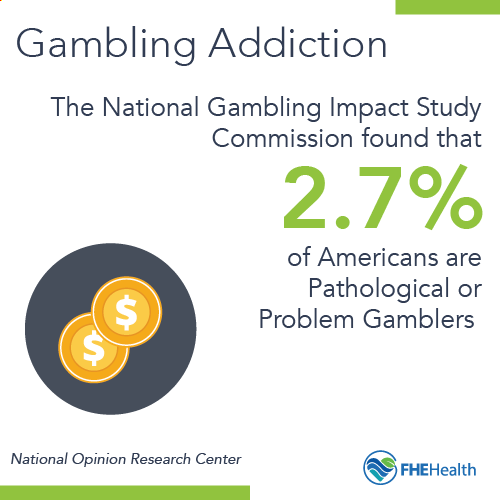 Gambling Addiction
Gambling Addiction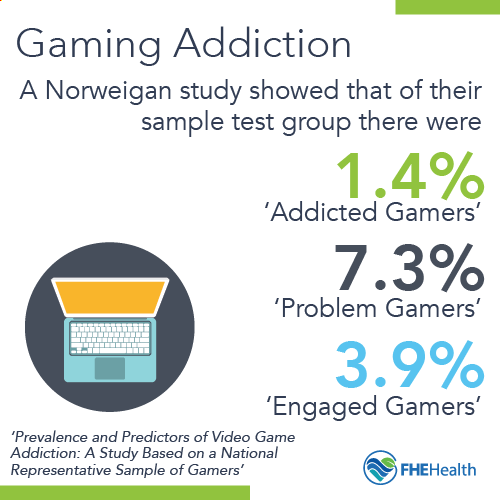 Gaming Addiction
Gaming Addiction







